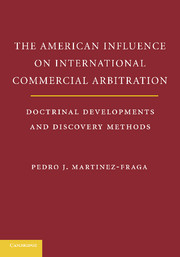 The American Influences on International Commercial Arbitration
The American Influences on International Commercial Arbitration Book contents
- Frontmatter
- Contents
- Table of Citations
- Acknowledgments
- Foreword
- Preface
- 1 Introduction
- 2 The Formation and Transformation of the Status of International and Domestic Arbitration in the United States
- 3 Wilko v. Swan, Scherk v. Alberto-Culver, and Mitsubishi v. Soler: Crafting a Level Playing Field
- 4 Procedural Change and 28 U.S.C. §1782: The Taking of Evidence v. Common Law Discovery
- 5 The Gathering of Evidence v. Common Law Discovery
- 6 What Has Really Happened? The Effects of a Trilogy Examined
- 7 The New Unorthodox Conception of Common Law Discovery in International Arbitration
- 8 And Now How Do We Avoid 28 U.S.C. Section 1782 in International Commercial Arbitration?
- 9 Perjury & Arbitration: The Honor System Where the Arbitrators Have the Honor and the Parties Have the System
- 10 Developments in the Apportionment of Jurisdiction Between Arbitrators and Courts Concerning the Validity of a Contract Containing an Arbitration Clause, and Transformations Regarding the Severability Doctrine
- 11 U.S. Arbitration Law and Its Dialogue with the New York Convention: The Development of Four Issues
- Conclusion
- Appendix A Duelo a Garrotazos
- Appendix B Selected Cases
- Appendix C The New York Convention, The Federal Arbitration Act, and 28 U.S.C. §1782
- Appendix D Amendments to 28 U.S.C. §1782
- Appendix E Selected Rules of Civil Procedure
- Appendix F Geneva Convention of 1927
- Appendix G Selections from the Legislative History of the Federal Arbitration Act
- Index
- References
11 - U.S. Arbitration Law and Its Dialogue with the New York Convention: The Development of Four Issues
Published online by Cambridge University Press: 11 July 2009
- Frontmatter
- Contents
- Table of Citations
- Acknowledgments
- Foreword
- Preface
- 1 Introduction
- 2 The Formation and Transformation of the Status of International and Domestic Arbitration in the United States
- 3 Wilko v. Swan, Scherk v. Alberto-Culver, and Mitsubishi v. Soler: Crafting a Level Playing Field
- 4 Procedural Change and 28 U.S.C. §1782: The Taking of Evidence v. Common Law Discovery
- 5 The Gathering of Evidence v. Common Law Discovery
- 6 What Has Really Happened? The Effects of a Trilogy Examined
- 7 The New Unorthodox Conception of Common Law Discovery in International Arbitration
- 8 And Now How Do We Avoid 28 U.S.C. Section 1782 in International Commercial Arbitration?
- 9 Perjury & Arbitration: The Honor System Where the Arbitrators Have the Honor and the Parties Have the System
- 10 Developments in the Apportionment of Jurisdiction Between Arbitrators and Courts Concerning the Validity of a Contract Containing an Arbitration Clause, and Transformations Regarding the Severability Doctrine
- 11 U.S. Arbitration Law and Its Dialogue with the New York Convention: The Development of Four Issues
- Conclusion
- Appendix A Duelo a Garrotazos
- Appendix B Selected Cases
- Appendix C The New York Convention, The Federal Arbitration Act, and 28 U.S.C. §1782
- Appendix D Amendments to 28 U.S.C. §1782
- Appendix E Selected Rules of Civil Procedure
- Appendix F Geneva Convention of 1927
- Appendix G Selections from the Legislative History of the Federal Arbitration Act
- Index
- References
Summary
U.S. common law developments in the field of international commercial arbitration are practically too numerous and vast in scope to articulate, let alone analyze within a paradigm that seeks to discern doctrinal development. This task is rendered even more daunting when the proposition that “development equals progress” is challenged as a tenet that lacks inherent universality, and therefore is only true depending on the particularity of circumstances without in itself embodying apodictic features. Therefore, the developments analyzed here have been limited only to four salient principles having one common denominator; the extent to which they may justify amending the New York Convention to further the principles of uniformity, predictive value, certainty, party-autonomy, and transparency of standard in the Convention's application.
Together with the creation of the International Criminal Court (the “Rome Statute”) and the European Union, the New York Convention is likely the most successful international juridic accomplishment of the past century. As of this writing, the Convention enjoys 142 signatory nations. It can be asserted with confidence that the entire international commercial community of nations has signed the Convention. The absence of transnational courts of civil procedure vested with jurisdiction to adjudicate international private disputes has created a void that international commercial arbitration is filling in a manner universally acclaimed as effective and essential to the success of international commerce, particularly in a climate of economic globalization. The myopic effect of commenting on contemporary historical developments creates the expected distortion that erroneously reconfigures historical perspective.
- Type
- Chapter
- Information
- The American Influences on International Commercial ArbitrationDoctrinal Developments and Discovery Methods, pp. 151 - 187Publisher: Cambridge University PressPrint publication year: 2009


